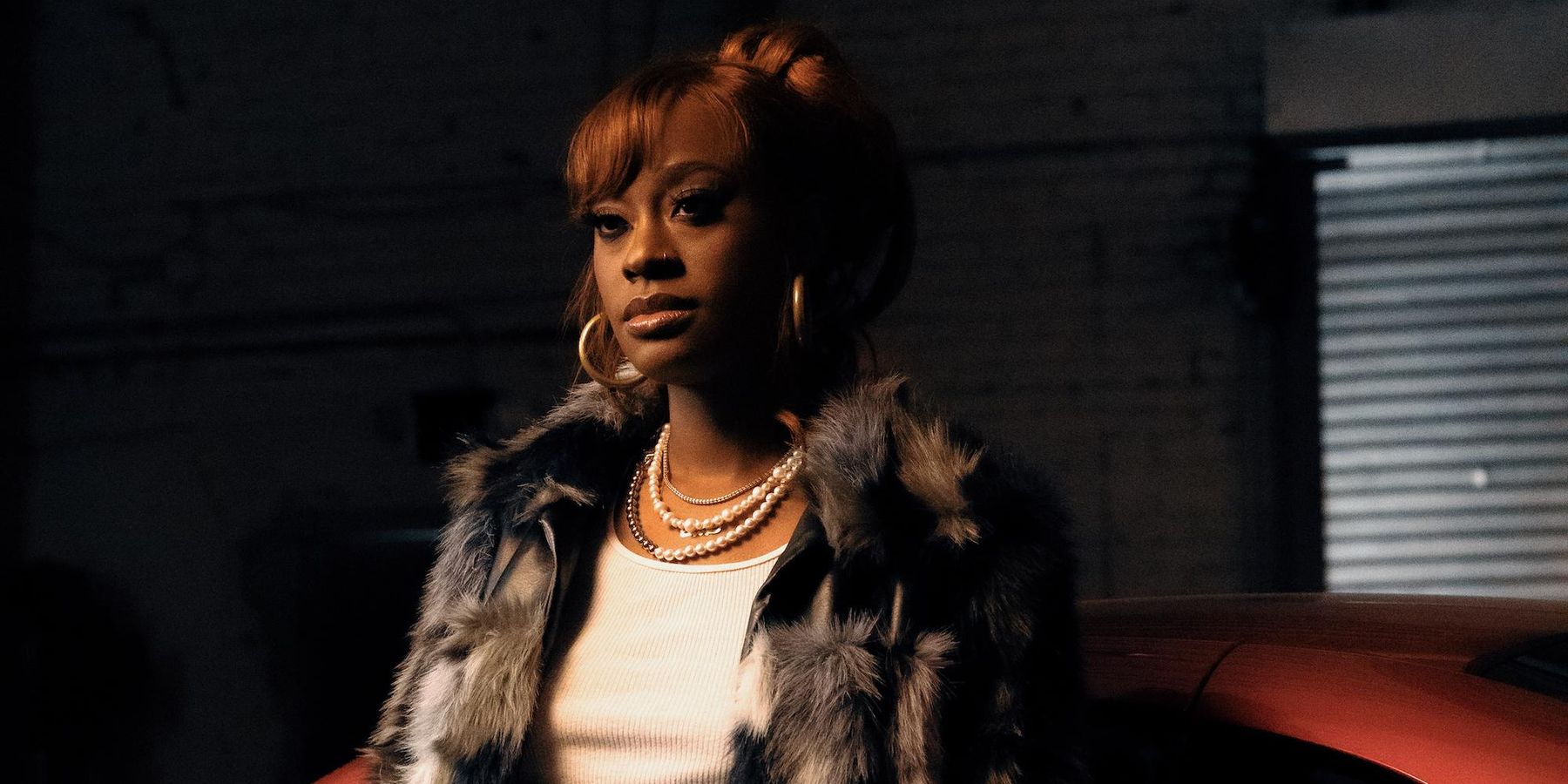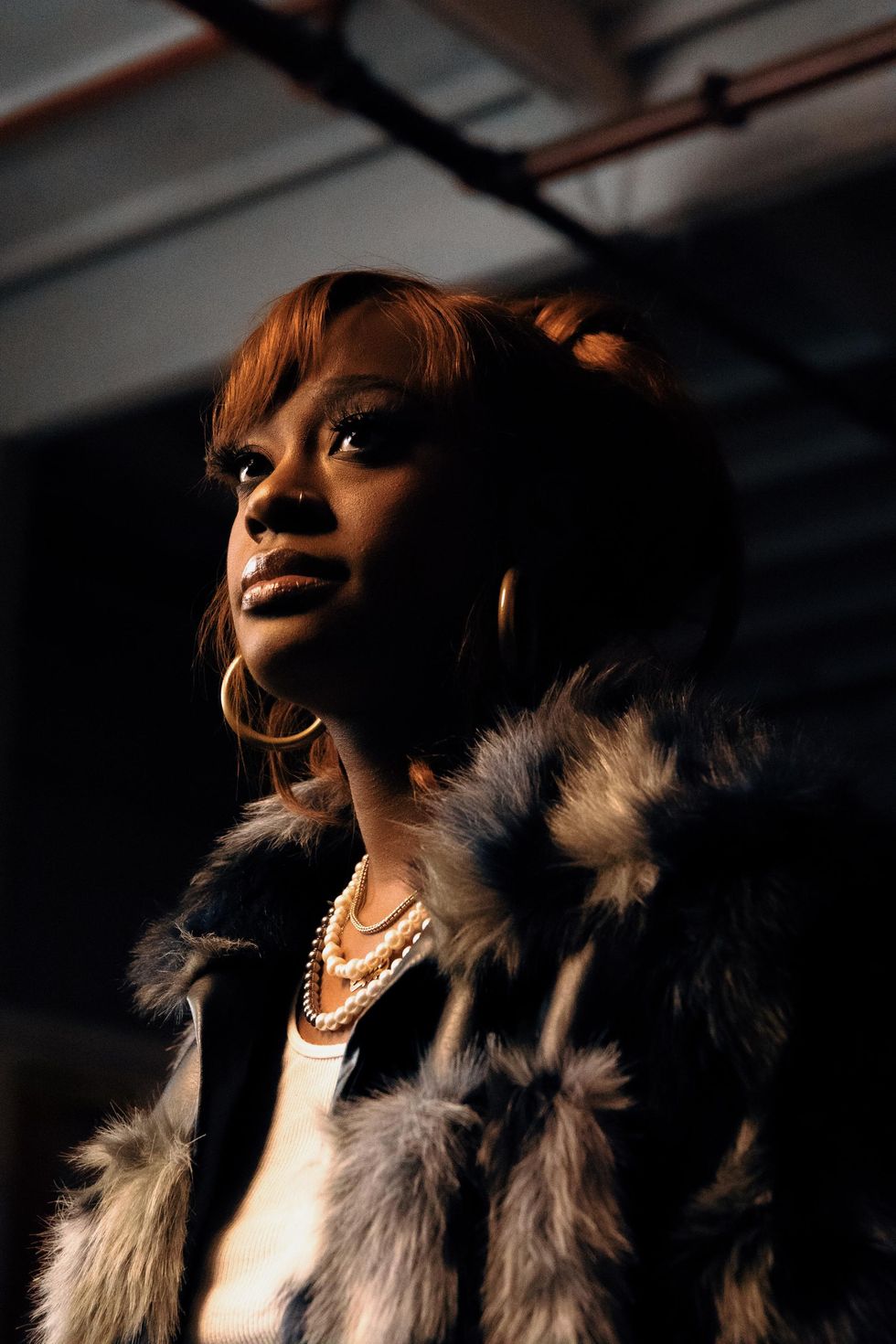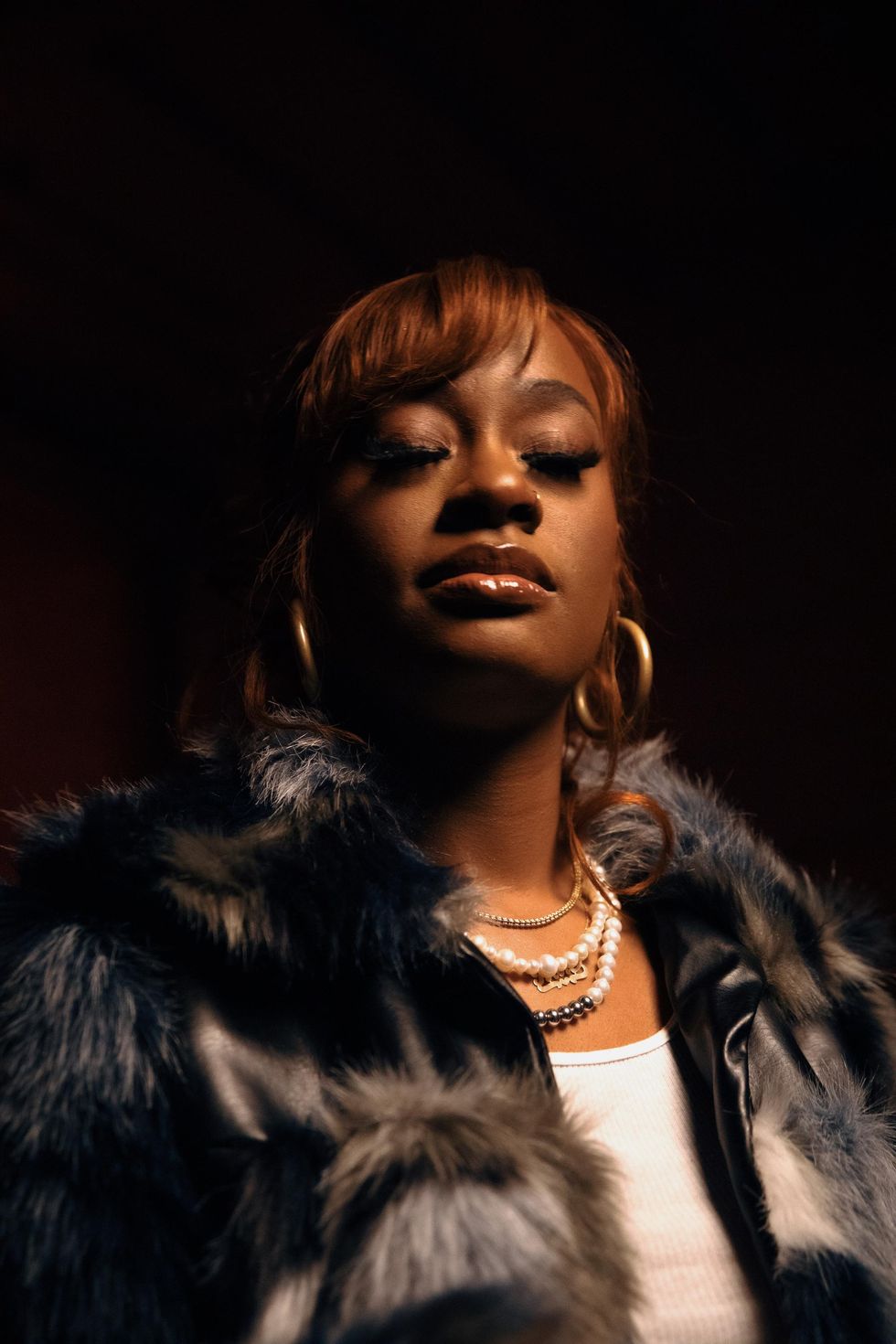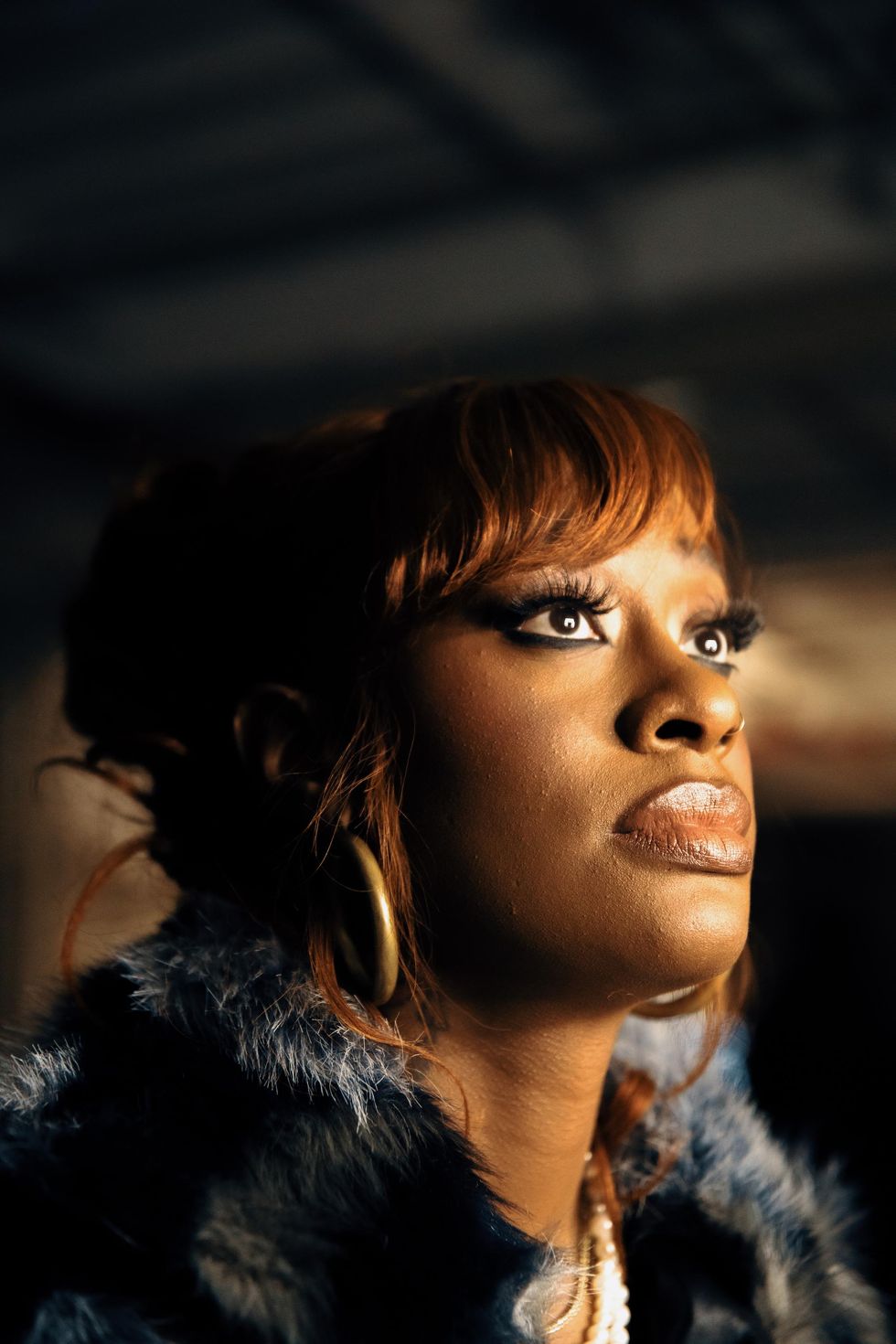
Looking at Kari Faux's stacked resume — working with acclaimed acts such as Isaiah Rashad and Childish Gambino — it's easy to forget that it all started in her bedroom. After capturing the collective attention of the tail end of the blog era with her incredibly catchy "No Small Talk," the Arkansas-born rapper was thrust into the mile-a-minute music industry. Nonetheless, she admirably remained with feet planted firmly in her soil, refusing to compromise her artistry and vision.
Taking from the deep, rich Southern rap lineage that she grew up admiring, Faux approaches a decade in the spotlight while remaining entirely independent. Doing so doesn't come without its drawbacks, and, during the pandemic, Faux nearly threw in the towel. She left Los Angeles and returned home to Arkansas, eventually making her way to Houston, Texas. With the familiar Southern silence and slowness grounding her back in her process, she began to create once more. Thus, "ME FIRST" was born.
Related | Kari Faux's Guide to 'Lowkey Superstar'
Her warm, deep voice slides over window-shaking bass, taking cues from her new home's love for cars and trunk-rattling bangers. From the club to headphones, Faux's empowerment anthem takes on multiple meanings as she raps, "It's me first, n***a/ 'Cause you know I put in work/ And you know I know my worth." Its accompanying video embraces the liberating scrappiness of working with limited resources and budget as Faux refuses to let a label snag get in the way of executing her vision.
Below, read PAPER's conversation with Kari Faux about "ME FIRST," Southern rap pioneers and learning to love making music again.
You're now a few years removed from your last project and launching your independent label. What was the space you were in going into making this song?
It's funny because the space I was in when I made "ME FIRST" was I actually had decided that I was going to quit music.
Why?
The music industry is just very tiring. I love making music. But then the other side of it is it can become exhausting, especially with me. I've been doing this for almost 10 years and I've pretty much been in control of my own career for most of it. I like managing myself and doing all these different things. On the first day of 2022, I got this pack of beats from my friend. "ME FIRST" was one of the first ones I heard, and then I just started freestyling to it. It just turned into a song from there.
Music reeled you back in.
Yeah! I ended up recording the song and it just reminded me that I really do love music and I shouldn't quit. "ME FIRST" is more of just an affirmation of putting yourself first. It's not necessarily being afraid of not being liked or not being accepted, it's just putting your own needs first. Because sometimes we try to do things that we think other people will like, and then ultimately we're just unhappy.
What did you do to take care of yourself to get back into enjoying what you do? A big part of it seems to be that it began to feel like a chore more than something you did because you loved it.
It was about centering myself and finding the joy in why I even started making music in the first place. During the pandemic, I moved from LA back to the South. I was living in Arkansas for a year, and just being closer to family and closer to the culture and slowness of the South really just made me feel grounded and validated in the person and the artist that I was when I first started making music. I found the love for it again by being reminded, Hey, you was this kid in your room in Arkansas doing this thing! I didn't know if it was gonna work.
What's it like going back home? I noticed a lot more artists are doing that now. LA is the goal for so many people, but so many people are going back home to reset.
I've been back home so many times. I'm never ashamed to go home and start over, but this last time, I think that being away from what I'm used to for five years really made me feel like I was scrambling and throwing shit at the wall, seeing if it stuck. With Lowkey Superstar, I got fully immersed in the music that I grew up listening to again. I don't hear any of those songs or sounds anymore in music today. I think that's what's gonna make this music stand out — I'm channeling those things that I loved like early 2000s rap and crunk. You know, the shit you hear in the club that makes you want to stand on top of the tables and go crazy. I want to hear that in music now, and I feel like that's the inspiration I'm pulling from with this music.
It's funny you say that because I was just thinking about how we are getting regional sounds again in music, especially with GloRilla pulling from Memphis crunk, all the New York drill artists, Saweetie sampling hyphy songs.
Yes! I feel like regionalism is actually starting to come back. And it's funny because it's coming back with the girls. With the guys, they just like, We from everywhere.
Why do you think it is that the girls are the ones doing that?
It's the girls! It's the girls and the gays. I really don't know. To me, it actually makes what I'm about to release make sense. It'll fit. It's the girls. We the most innovative.

So let's talk about the video for "ME FIRST." I love the whole concept, and I love that you illustrate this story of breaking free from major labels and doing your own thing despite always being independent.
That's the story of my life! I have these ideas. This is the vision, this is what I want it to look like. But your bank account is like, "You got to scale it down, bitch." I just want to be honest about everything. You could go get a big car and make it seem like this is the life that you live. For me, it's just about being extremely authentic. That's what it is. Sometimes you gotta scale the shit down, but that doesn't mean that it's not as heartfelt.
I also love the double entendre in the song.
That's the thing about me, I love double entendres! And I love sexual innuendos. I have to come first, in all ways. It's just more about just being empowered in every way and always making sure that I get what I need because everybody else is gonna get what they need. Why not look after me first?
As an independent artist, how do you figure out when to stop and release the music when you're the one in control?
It's really easy. I have a lot of peers where all they do is make music. I'm very project-driven. For "ME FIRST" and a new song "Money Angels," I made them at the same time. I love them. They're very strong. And I was like, Okay, this is the start of the album. So now I have these two pieces and everything else I make has to be centered around these two things, which also helps me understand what it sounds like, what the story is and where we're going. It has to feel grand, it has to feel like the start of a play when the curtains are being drawn back. At some point, you know where to end. It took us a minute to get the last song because we really want this to be heartfelt. We really wanted to close it out. It's literally a puzzle.
So as you said, like, a lot of your peers are just constantly making music and stuff. It seems like you know how to compartmentalize your process.
When I decide that I'm making a project, every day for however many months is dedicated to that, making music or not. Maybe I need to listen to some old shit to get inspired, or just find things that inspire me. Every day is dedicated to it in some way. It may not be recording, it may not be writing, but it's conversations.

You're probably the first artist I've ever spoken to who has that process.
When I have too many options, I'm like, [bleh]. Yeah, I can't. We actually made 22 or 23 songs, and then we narrowed it down to 13. Now I have all these pieces, what's the story that we want to tell? What's the picture that we're trying to make? I try to make around 25 to 30 songs, no more than that, because I don't want to have 150 songs, and then we got to make an album. If you're making 150 songs, you may be in a different place. Also, I take really long breaks. I'll write random thoughts, conversations that I have, and then later when I go into the studio, I'm using those notes that I have. That's how it turns into a song.
What were you listening to when making these songs?
Most of it was getting my boyfriend Phoelix, who produced the album, up to speed on Southern rap music because he's from a suburb of Chicago. He's heard some stuff. Crunk Juice is one of my favorite albums. I still have it on CD. That album is just so funny because he plays rock music, crunk, go-go, R&B. He's just doing all these different sounds, but he's making them super hype. I put him on to a lot of Three 6 Mafia and their affiliates like Gangsta Boo, who was actually a friend of mine. I put him on to Project Pat. He will not stop playing Mista Don't Play. I also love Parliament Funkadelic. And then he was also showing me a lot of jazz. He's a jazz musician, so he's showing me a lot of Herbie Hancock, Miles Davis, John Coltrane. Also, he grew up in church. I grew up in church. There's the gospel element there.
There's a special relationship between the South and the Midwest with the musical exchange that was made.
And migration! Black people from the South just migrated up to the Midwest. A lot of that blues traveled up the Mississippi essentially. That's why if you go to Chicago and you hear people talk, they sound so country! It just shows that a lot of Black people migrated from the South. A lot of Southern Black music is the foundation for a lot of the stuff that we hear.
Southern artists really dominated the charts, and it speaks to the resourcefulness of those artists and labels. You had people like Master P and J. Prince starting labels out of their homes. Likewise with DJ Screw.
Yep, Master P with No Limit [Records]. That shit is still fucking insane to me. He was just pumping out album after album after album after album. And I think at that time, he was the first rapper that had a super crazy distribution deal. He got paid so much money to be able to distribute and make the music and do all these things. It's the entrepreneurial spirit of Southern Black people just being like, "Man, I just gotta figure it out." It's really beautiful to see that and be inspired by that and then apply that to myself. I'm in the middle of fucking Arkansas, and I'll make it happen.
I was just telling my label head that I remember back in the blog era, I used to go and find the writers that would write about artists I like. I would find them on Twitter or Instagram and then I would get a job for a week and a half, get a nice check, quit the job, drive down to SXSW and literally try to find these writers and meet them. I would meet them and share my music with them and they will start posting about me. One time I came to New York and I went up to Noisey and I told them I had a meeting with them. They brought out these other two guys. He was like, "Who do you have meetings with?" Nobody! But I just wanted to tell you that I'm Kari Faux and I have the song "No Small Talk" coming out in a week and I want you to write about it. He said, "I actually saw you at SXSW! Send it over." It's funny because later they told me that I was the reason why you couldn't just walk up to Noisey. Their security intensified after that.
There was a magic with the blog era. What was it like being part of two different eras of the digital age?
There are pros and cons to both to both sides of this. Back in the blog era, it was extremely fucking hard to get anybody to listen to you, especially a woman from a city that nobody even knows where it is. People would be like, "Arkansas? There's Black people there?" It was hard. I was just as frustrated as I am now, but it was fun. There were just so many moments that would happen around the blogs, you know what I mean? You're getting to meet these people, you're meeting writers, and it just felt really special and connected in a communal kind of way. You have these things in common with people, and you're all showing up to these things. It has its pros because now I don't have to go through a certain writer or certain blogs. I can put it out there and people will gravitate toward what they want to freely. But then on the other side of it, there's the viral moment. Everybody's striving for it. Sometimes I feel the pressure. I just have to remind myself that it's not always the thing to strive for. Just as quick as you can be here, people can forget about you if you have no follow-through or follow-up.

You're definitely carrying on the torch of amazing people such as Gangsta Boo and all these other Southern female rappers who reappropriated this sexual language and made music not for the male gaze. What's that like?
I love that you said they reappropriate and it's not for the male gaze. The way that Gangsta Boo was talking in the songs, it was hard. She was never trying to appeal to men and was like, Actually I'm more gangster than you! She's hard as hell. Me growing up listening to Gangsta Boo, La Chat, Mia X and just seeing how they carried themselves like, I'm gonna walk into a room with a bunch of guys and I'm gonna have respect, I've always saw that and admired that and wanted to be them.
So to be able to listen to her music and get that from her without knowing her, and then getting to meet her and actually have conversations with her and let her hear music that I'm working on? To get the confidence and the confirmation from her that I'm doing my shit is all I really needed. I'm just excited for my new music. Like, it's some real shit. It's some shit that I play at a function and motherfuckers start pushing, standing on tables, flipping shit over like they did with "Tear Da Club Up '97."
Cardi B said it best when she said that all these songs are sad and maybe we just want to shake some ass.
I feel like the girls are bringing that back! I love everybody out right now. As much as everybody is like, "These women are just rapping about their pussies!" They're being way more creative about it than the guys. I'm just excited to see where music goes with the girls being in the forefront. It's only just gonna keep getting better and being more innovative because that's what we do. We just take shit and we innovate and make it better, and I love seeing the guys turn up to a girl. When I did that shit on COLORS, there were a lot of guys that were like, "Man, I'm bumping this shit in my car! Even though it's a girl talking about putting yourself first, I feel that!"
I love everything that's happening right now. I never thought I would see like happening again after Missy, Eve and Lil Kim. I never thought I'd see this many girls going crazy.
Photos courtesy of Maya Iman